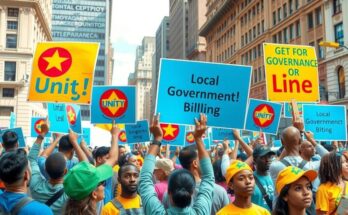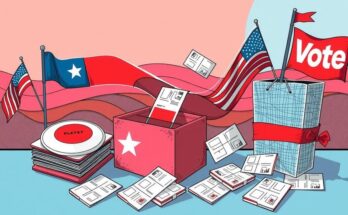The declaration of a state of emergency in Rivers State by President Bola Tinubu has sparked widespread tension and concern regarding the future of democracy in Nigeria. Critics highlight the potential legitimization of military juntas in West Africa and warn of adverse effects on foreign investment and economic stability. The marginalized Ijaw community feels increasingly disenfranchised amid ongoing political crises, and the situation raises alarms over the future of governance and peace in the region.
Currently, Nigeria is engulfed in tension, particularly in Rivers State. Following President Bola Tinubu’s declaration of a state of emergency, suspending Governor Sim Fubara and other officials, many Nigerians are questioning whether their nation is emulating the military juntas of Niger, Mali, and Burkina Faso. There is a widespread concern regarding the legality of such actions against a democratically elected government and the ramifications for Nigeria’s political landscape.
The Nigerian Bar Association has criticized the president’s order as illegal, advocating for a political resolution instead of military intervention. Critics argue that if democracy is to endure in Nigeria, internal conflicts must resolve through dialogue rather than authoritarian measures, which may inadvertently legitimize the military juntas in neighboring countries.
Previously, the Nigerian government vehemently condemned the ousting of elected leaders by the military in Niger, Mali, and Burkina Faso. However, the military juntas justify their actions by arguing that former leaders had compromised their nations’ assets for foreign interests. In the case of Niger, for instance, the junta claimed significant financial gains after seizing control of uranium resources, which had previously benefitted foreign firms disproportionately.
Observers warn that the recent military-like actions in Rivers could exacerbate instability, potentially deterring foreign investment crucial for Nigeria’s economy. Critics of the state of emergency suggest it might not address the root causes of violence and governance issues, merely prolonging political discord and risking an economic downturn.
Moreover, the lack of direct acknowledgment of key figures in the crisis, such as Nyesom Wike, raises concerns about the balanced governance necessary to stabilize Rivers State. With democracy seemingly at stake, citizens fear that any failure to reconcile political tensions could lead to further violence and economic hardship.
Amid growing unrest among the Ijaw people regarding historical marginalization, there are fears that the current political crisis may escalate into broader conflicts reminiscent of past disruptions in the Niger Delta region. The community’s grievances are compounded by recent Supreme Court rulings delaying access to federal allocations, which they see as an insult to their contributions to the nation’s economy.
The current climate poses a significant risk to essential oil production, an economic lifeline for Nigeria currently recovering from severe theft and production declines. As nations like Nigeria seek foreign investments, incidents like the recent tensions in Rivers State could deter potential investors wary of political instability. Long-term solutions focusing on job creation and economic growth are imperative to restore confidence among prospective investors and stabilize the situation in Rivers State.
In summary, Nigeria faces significant challenges stemming from the recent declaration of a state of emergency in Rivers State. Critics argue that such actions threaten the democratic framework and may inadvertently justify military takeovers in surrounding nations. The resulting instability poses risks to foreign investment and economic recovery, necessitating a focus on political resolution and comprehensive governance reforms. The situation underscores the urgent need for dialogue and coalition-building to ensure peace and political stability in Nigeria.
Original Source: businessday.ng




